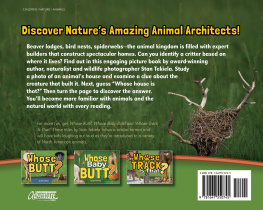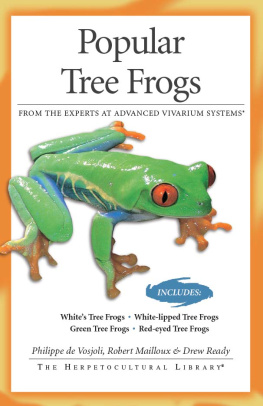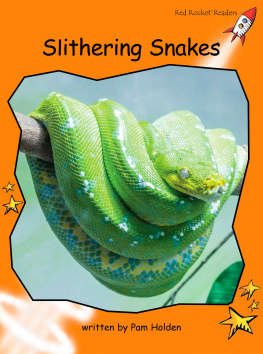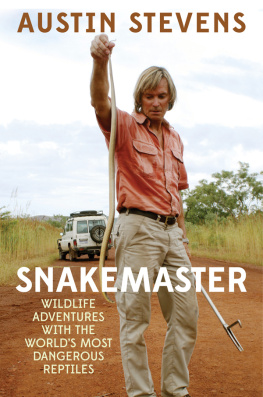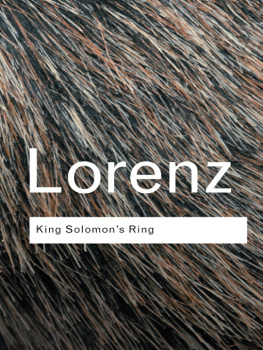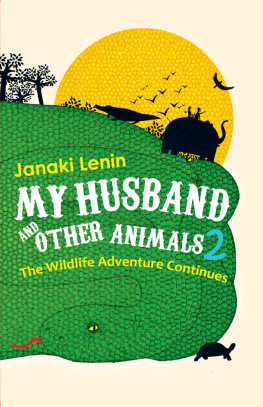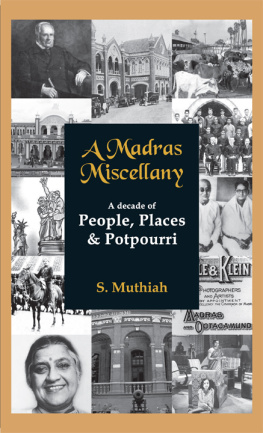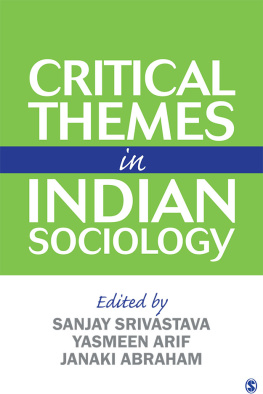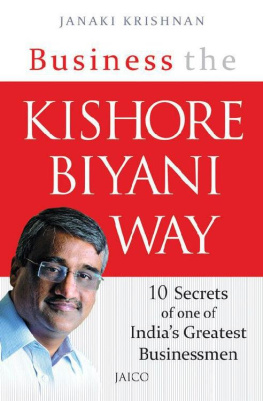westland ltd
MY HUSBAND AND OTHER ANIMALS
Janaki Lenin has always had an interest in animals but living with Rom took it to the stratospheric level. They lived in the Madras Crocodile Bank for a few years, surrounded by thousands of crocodiles, snakes, turtles, and lizards. Rom and Janaki made documentaries about wildlife in wild places for a living.
When they moved to their farm in rural Tamil Nadu, Janaki thought it would be a perfect retreat after the many arduous months of filming. Instead, a whole new set of challenges popped up from pesky tree frogs and adamant Russells vipers to a dog-eating leopard. She thinks shes made her peace with the many wild creatures who have staked claim to their farm, but who knows what tomorrow may bring. Rom and Janaki live with four dogs, a pair of emus, a flock of geese, and a pig. Its her childhood dream come true.
Praise for My Husband and Other Animals
With insight, verve, and deep feeling, Janaki Lenin writes about the creatures around her, from tree frogs and snakes to her dog and husband. Her essays are a delight to read.
George Schaller, wildlife biologist,
Wildlife Conservation Society, New York
The legendary M. Krishnan set a near-impossible standard for nature and wildlife columnists. Janaki Lenin has got there with effortless ease and the added appeal of a very feminine sensibility tromping both barefoot and in the most rugged footwear.
Gopalkrishna Gandhi, former administrator,
diplomat, governor, and author
Im an ardent follower of the wildlife encounters some threatening, some hilarious, some heartbreaking of Janaki and Rom in jungles in India and around the world and read her weekly column with some envy, wishing I was with them.
Timeri N. Murari,
author of The Taliban Cricket Club
Janaki Lenin explores the familiar and unfamiliar aspects of nature with a knowledgeable sense of humour and a sharp eye for detail. Her columns in The Hindu follow the tradition of Gerald Durrell but also wander off the beaten track, blending personal and scientific observations on Indias diverse ecology and natural heritage.
Stephen Alter, author of Elephas Maximus:
A Portrait of the Indian Elephant
Janaki Lenin has honed a rare talent to be both engagingly accessible and scientifically authoritative. She is fast becoming our home-grown David Quammen.
Pradip Krishen, author of Trees of Delhi
My Husband and
Other Animals
JANAKI LENIN
westland ltd
Venkat Towers, 165, P.H. Road, Maduravoyal, Chennai 600 095
No. 38/10 (New No.5), Raghava Nagar, New Timber Yard Layout, Bangalore 560 026
Survey No. A-9, II Floor, Moula Ali Industrial Area, Moula Ali, Hyderabad 500 040
23/181, Anand Nagar, Nehru Road, Santacruz East, Mumbai 400 055
4322/3, Ansari Road, Daryaganj, New Delhi 110 002
First published in India by westland ltd 2012
Copyright Janaki Lenin 2012
All rights reserved
ISBN: 978-93-81626-72-6
For sale in the Indian Subcontinent only
Illustrations by Gynelle Alves
Typeset in 10/14 pts. PalmSprings by SRYA, New Delhi
This book is sold subject to the condition that it shall not by way of trade or otherwise, be lent, resold, hired out, circulated, and no reproduction in any form, in whole or in part (except for brief quotations in critical articles or reviews) may be made without written permission of the publishers.
Contents
It seems these days as if people have forgotten their biological roots or lost interest in animals and plants or been led astray by modern attention-grabbers, such as celebrities, computer games and Facebook. The biodiversity of Planet Earth apparently doesnt matter any more, and this concerns me greatly.
Its clear that Janaki Lenin feels the same. Trying her hand at documentary film-making, she defied the television executives who wanted human personalities to dominate the screen in programmes about animals. And I am glad she did, as her rebelliousness gave impetus to her column in The Hindu, on which this book is based.
This delightful compendium goes a long way to filling the current gap in popular writing on the subjects of wildlife and natural history.
Like Gerald Durrell, my late husband and one of her heroes, Janaki demonstrates a refreshing breadth of interest in and knowledge of natural history, linking nature to her spouse, to all human endeavour, to God and the Universe!
The topics with which Janaki enchants her readers are incredibly diverse and always fascinating. Virgin birth in reptiles, how to train animals (including husbands), invasions by tree frogs and egrets, the innocuous-looking, but pain-inflicting devil nettle and the fabulous makara and fearsome kirtimukha of Hindu mythology are just a few of her themes.
More than this, Janaki, again like Gerald, uses humour, storytelling and an easy, gentle style to remind us of the links between humans and the other species on the planet. It is upon these relationships that civilization rests, although few admit it or even recognize it today. But think about it ... from domestication of animals and plants, to love of the land, to inspiration derived from the intricacy, grandeur and beauty of nature, these connections make us humans what we are.
If our species is to persist, severing these connections is not possible, although, given our track record with the natural world, we seem to be trying hard to do so!
Janaki asks, ... what compels us humans to gobble and destroy our way through Earths resources until there is no tomorrow? The answer is that we have forgotten how we became human beings, how we evolved with and depended upon other species.
Janaki asks, Are we hell-bent on sending this unique life-sustaining planet to Saturn, the haunted house of Hindu astrology? At present the appalling answer is certainly yes, but it doesnt have to be. If we can collectively recall our evolutionary history, acknowledge our dependence on the ecosystem functions sustained by biodiversity and behave as if we believe in it, then Earth... and we... will survive.
My Husband and Other Animals began as a short article for the Madras Crocodile Banks newsletter, Herpinstance. I wrote about the many little creepy crawlies that shared our home with us on a farm, near a town called Chengalpattu, not far from Chennai city. The article was called Creepy Crawly Household.
A few months later, K.V. Sudhakar of the Madras Naturalists Society asked permission to reprint this article in the Societys newsletter, Blackbuck. I said I could do better. I expanded on the theme chronicling the slow colonization of our home and garden by various creatures. I called the piece Life on the Edge of the Scrub.
Perhaps a year or so later, Prerna Singh Bindra used the article for Air Deccans in-flight magazine, Simplifly. Then she wanted to include it in her anthology of wildlife writing, Voices in the Wilderness. While I was editing the piece to the required word length, the title occurred to me in a flash: My Husband and Other Animals.
At the same time, S. Theodore Baskaran edited a collection of articles from the Madras Naturalists Societys newsletter called The Sprint of the Blackbuck. It was embarrassing to have two anthologies print the same article under different titles in the same year, but it was beyond my control. I didnt know about The Sprint of the Blackbuck anthology until it was too late. No other article Ive written has been requested for reprinting so many times.


